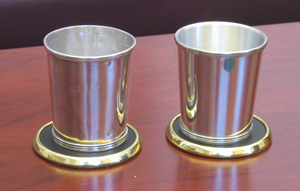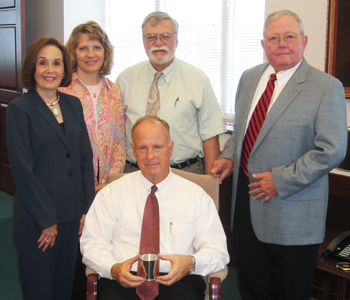Museum Board Selling Sam Houston Julep Cup Replicas
 |
| Sam's julep cup, left, and the modern replica. |
Whether Sam Houston ever had a mint julep or why he bought a
set of julep cups while proclaiming himself a "whole souled
teetoteller" is as much a mystery as why his first wife
suddenly left him.
Historians
don't think Sam's drinking was the problem back when he resigned
as governor of Tennessee and headed west. More likely Eliza Allen
had loved another and had been forced by her family to marry
Sam.
Whatever. Sam
never said.
But the advisory
group Friends of the Sam Houston Museum did some research on
julep cups like the ones owned by Sam Houston and his family
and now exhibited in the Museum on the Sam Houston State University
campus. The result is that amateur historians can now buy replicas
of the Sam Houston family vessels and ponder those questions
to their hearts' delight--over their choice of that traditional
Southern symbol of hospitality or a cup of cold "sweet" tea.
 |
The first set of julep cups was presented to James F. Gaertner,
Sam Houston State University president. Making the presentation
were, from left, Marta Edwards, member of the Friends of
the Sam Houston Museum board, who developed the julep cup
sale project; Cindy Truax, University/Museum liaison; Patrick
Nolan, Museum director; and George Miles, board president. |
The Museum
owns three of an original set of six sterling silver "julep
cups" purchased between 1854 and 1858 with $500 Houston
received from his military service during the War of 1812. Sam's
personal cup was engraved with the word "Father," passed
to his son William Rogers Houston and then down through the
Houston family before it was given to the Museum in 1930.
Patrick Nolan,
Museum director, said that a legendary story that Sam had the
silver coins he received melted down and made into the silver
service and the cups is not true. He did use the money to buy
the set made by Taylor and Laury of Philadelphia from the M W
Galt & Bro. Washington, D. C., jewelry and silver shop.
The cups now
on sale are exact reproductions except that they are made of
pewter. They are reputed to be the equal of silver for the serving
of those traditional Southern libations, alcoholic or otherwise.
The reproductions
are now on sale at the Museum gift shop for $90 each or $160
per pair. They are a bit over three and a half inches tall and
hold 10 ounces of beverage.
Nolan said
they may also be available soon at the San Jacinto Battlefield,
Washington-on-the-Brazos, and The Alamo. He's touting them as
excellent gifts for the Sam Houston history buff who has everything
or special occasion gifts for Huntsville visitors.
Sam Houston's
relationship with alcohol is just one of the many interesting
aspects of his fascinating story. He drank so heavily when living
with the Cherokees, after that failed first marriage, that they
called him "Big Drunk."
That Houston
overcame this weakness is also unquestioned and is considered
one of his most admirable personal accomplishments.
When Houston
married Margaret Lea of Alabama, a devout Baptist, he was spiritually
amiss. His family had been Presbyterian but he seemed more comfortable
with the Cherokee theology and its supernatural that lived in
the earth, air, trees and streams.
When he came
to Texas he officially became a Roman Catholic because the Mexican
government required landowners to be of that faith. But it was
Margaret who eventually persuaded him to become a baptized Baptist
and to give up alcohol.
Sam Houston
biographer Marshall De Bruhl wrote about Sam's struggle with
drink and its progress in the mid-1840s.
"Sam had
also sobered up--at least he practiced what passed for abstinence," De
Bruhl wrote in Sword of San Jacinto . "He drank
only bitters and orange peel. This favorite drink which he disingenuously
assured Margaret was harmless, registered eighty proof, 40 percent
pure alcohol--the same as bourbon, Tennessee whiskey, or gin."
That may have
been true in the mid-1840s when Houston was beginning his service
as U. S. Senator from the new state of Texas. But by the mid-1850s,
when he bought the julep cups, historians believe that he really
had whipped the habit.
Margaret,
by the way, was so opposed to alcohol that she once underwent
surgery to have a lump removed from her breast without any painkiller
at all. She was offered some whiskey by the surgeon but refused
it. One of the other cups owned by the museum is inscribed with
her name--"Maggie Lea."
By 1850, De
Bruhl wrote, Margaret had "weaned" Sam from liquor.
In 1854 he was baptized in Rocky Creek near Independence, Texas,
an event that provides Houston's well-known quote that if his
sins were washed away "the Lord help the fish down below."
One alcohol-related
event in the life of Sam Houston about that time indicates the
quandaries that he sometimes faced. Such as owning slaves yet
being against the spread of slavery and being a Southerner at
heart yet against secession from the Union.
If Houston
was anything he was independent and a deep thinker.
When he returned
to Texas from his U. S. Senate duties in Washington in 1853 he
was asked by a delegation of religious leaders in Nacogdoches
to join their effort to prohibit selling or consumption of alcohol
on Sundays in Texas.
"...He
was long since one of the Sons of Temperance," wrote biographer
James Haley (Sam Houston). "But to the depth of that enlarging
soul he was also a libertarian, a believer in freedom of choice
and the fundamental right of people to live without any governmental
interference not absolutely required by the public good."
He told them
their plan was "impractical and unenforceable." If
you prohibit sale in one constituency people will get it from
the one nearby, he said. Also, it was against the principle of
separation of church and state--such laws could be the first
link in a chain of bondage--it would be an injustice to the cultures
of minorities, such as the Germans who had settled in Texas.
"To declare
it to be a crime," he said, "to...drink in moderation
would, in effect, accuse Christ and the holy apostles of a sinful
practice."
Sam had been
right in his assessment that The Alamo was indefensible. He would
be right in his warning that the South could not win the Civil
War. He was right about Prohibition when the movement was just
beginning and 80 years before it was abandoned as a failure.
And despite
owning the cups made for alcohol consumption, Houston knew his
personal limitations. According to biographer Marquis James (The
Raven), he wrote a friend in 1851 that "for years past,
I have been a whole souled teetoteller, and so intend to be as
long as I live."
Haley said
Houston summed up his discussion on the Texas Sunday prohibition
proposal in this way:
"I believe
that total abstinence is the only way by which some intemperate
drinkers can be saved. I know it from my own personal experience."
—END—
SHSU Media Contact: Frank Krystyniak
June 22, 2007
Please send comments, corrections, news tips to Today@Sam.edu.
|


